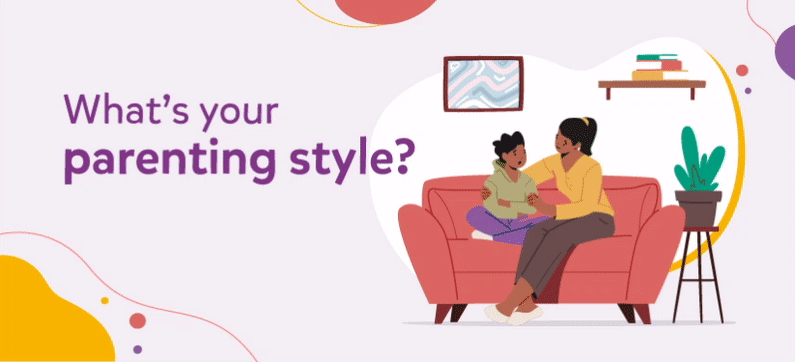
Are you a first-time parent? There could be a slew of questions running through your head. All of your actions and decisions directed towards your child will have a long-term impact on your child’s life, whether you realise it or not.
However, having enough information on parenting might help you in making an informed decision because there are various methods available, each with its own set of effects on the child’s development.
Here are four styles of parenting from which you can identify your own:
This parenting style entails exactly what its name implies: the parent sets the rules, and the child follows them. As a result, effective and positive two-way communication becomes difficult. Often, such parents expect their children to -be perfectionists without really taking the time to explain what is expected from them.
Moreover, the mischievous activities that the child engages in on a regular basis lead to frequent punishments. They are under a lot of pressure, and their parents expect them to deliver almost every time, while failing to often talk to them tenderly or nurture them effectively.
Effect: Even though these children grow up to be well-behaved and well-spoken individuals, often with a calm outward personality, chances remain that there could be an undercurrent of anger in them, making them prone to sudden outbursts. They also tend to deal with low self-esteem and struggle to make their own decisions.
With this style, parents strike a healthy balance of advice and caution – by telling a child why and what to do, while also clearly explaining the consequences if they are not obeyed. Moreover, this style of parenting gives opportunities for more frequent interactions between the parent and the child. While working towards helping their children set and attain goals, authoritative parents also do not overlook their children’s emotional needs.
Effect: These children grow up knowing how to channel their negative emotions effectively. They have minimal trouble developing into an independent individual and achieving their objectives. Other advantages include being less prone to depression, able to manage stress better, and being more assertive
There are no rules or expectations in this approach, but a lot of love. Children here are not overburdened with responsibility, and they are masters of their own choices. It’s very rare for the parent to dismiss the child’s request due to a lack of discipline in this parenting style. The closeness between the parent and child in this case can easily rival that of friends.
Effect: Due to a lack of norms and regulations, these youngsters are more inclined to indulge in undesirable practices. The unrestricted screen time, lack of discipline in homework and unhealthy snacking habits are common among such children. As a result, they grow up to avoid responsibilities, make rash decisions, become easily agitated, and are more likely to experience anxiety or despair. This open nature of communication with their parents makes them socially-skilled but selfish too.
These parents stick to the checklist and ensure their children’s daily needs are satisfied despite not being active in their children’s regular activities. As a result, there is no banter between the parent and the youngster. They might not even set goals for their children to work on, and the set of dos and don’ts that young people are usually required to follow is missing. In this type of parenting, it can appear as though the child is being neglected.
Effect: Faced with such challenging circumstances, these children grow up to be self-sufficient. This parenting style has a direct impact on the child’s emotional intelligence, making it difficult for them to form and maintain connections. It also impacts their academic achievement because their parents are disengaged and believe that they have no one to answer to. Depression, an inability to cope with stress, and a lack of self-confidence are issues these children face.
Any parenting method has a substantial impact on a child while they grow up, and the effects go far into their adulthood. While it is impossible to determine which parenting style is best for the child, combining the best features of each can help your child grow up into a responsible and stable adult
Have you discovered what method of parenting you are following? Are the effects of your chosen method in line with what’s been stated above? Do share your stories with us.
For all parents out there here are some self assessment questions that all parents need to ask themselves.
PARENTING STYLES AND PERSONALITY TRAITS AMONG SENIOR SECONDARY SCHOOL STUDENTS IN RIVERS STATE NIGERIA, WEST AFRICAN. (2015). https://www.eajournals.org/wp-content/uploads/Parenting-Styles-and-Personality-Traits-among-Senior-Secondary-School-Students-in-Rivers-State-Nigeria-West-African.pdf
Sanvictores, T., & Mendez, M. D. (2021). Types of Parenting Styles and Effects On Children. https://www.ncbi.nlm.nih.gov/books/NBK568743/
Types of parenting styles and effects on children – StatPearls – NCBI bookshelf. (2021, March 6). National Center for Biotechnology Information. https://www.ncbi.nlm.nih.gov/books/NBK568743/
Coupling her love for children with a zeal for writing, Sonakshi pens down words to make even the smallest difference in the lives of young readers. She believes words are a powerful tool that, when used wisely, can bring about a positive difference. In her spare time, she likes to prop open a book, scribble poetry, or go out on long walks for any stroke of inspiration!